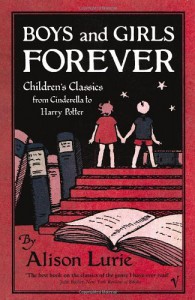Boys and Girls Forever: Children's Classics from Cinderella to Harry Potter - Nope

The sad thing is, this has been on my Amazon wish list forever.
The good thing: I never actually bought it.
While I have my own issues with literary study and criticism, sometimes I really like looking at something that means a great deal to me from an academic level. I enjoy seeing beyond my view and learning things that only a great deal of study could grant me otherwise. However, all to often, I find literary criticism to be...limited and limiting as well as unwelcoming to different views. I learned far too early in school that poetry almost never means to me what it is "suppose" to. Just that phrase angers me, as literature will mean something different to everyone; there are basic truths and others opinions can certainly aid in your understanding but I don't take critics' thoughts as gospel.
And while some of these essays definitely gave me food thought (her idea on the four March sisters in Little Women representing four "important contemporary views of womanhood" and the essay on children's games), I found much of this...simply aggravating.
It started with her introduction. She starts with the oft repeated line of children's authors having never quite grown up. Being in touch with your inner child is a definite must, but the way she says things. I can't quote lines or pinpoint specific parts, but I couldn't shake the feeling that while the stories might be held in esteem, she found this "childishness" distasteful. And it seemed to continue throughout the essays. She just couldn't seem to keep her personal feelings out of the criticism. Most of them I found tolerable at best.
As an example, another issue she seemed to have problems with was Harry Potter and its commercial success. While she seemed to praise several elements of it and connect it with similar children's stories that had come before, the way she delivered the section on its popularity and Rowling's reactions to the media storm came across as condescending. Some literature can be hurt by being popular (Twilight - which often disappoints more because of its buildup) but usually, in my experience, this stems from it not being very strong to begin with . Popularity does not a book's true value make...or break.
I did find a new poem I like:
"How To Treat Elves"
Morris Bishop
I met an elf man in the woods,
The wee-est little elf!
Sitting under a mushroom tall--
'Twas taller than himself!
"How do you do, little elf," I said,
"And what do you do all day?"
"I dance 'n fwolic about," said he,
"'N scuttle about and play;"
"I s'prise the butterflies, 'n when
A katydid I see,
'Katy didn't' I say, and he
Says 'Katy did!' to me!
"I hide behind my mushroom stalk
When Mister Mole comes froo,
'N only jus' to fwighten him
I jump out'n say 'Boo!'
"'N then I swing on a cobweb swing
Up in the air so high,
'N the cwickets chirp to hear me sing
'Upsy-daisy-die!'
"'N then I play with the baby chicks,
I call them, chick chick chick!
'N what do you think of that?" said he.
I said, "It makes me sick.
"It gives me sharp and shooting pains
To listen to such drool."
I lifted up my foot, and squashed
The God damn little fool.
I have learned a new author to try, Tove Jansson's Moomintroll series four one, and new food for thought. So in the end, I sort of got what I wanted out of reading this; however, really all I was left with was a sense of disappointment.
Thank goodness for library checkouts, now I can look for something more to my taste.
And once again, my cover was different. It looked like this: 
 9
9
 4
4












